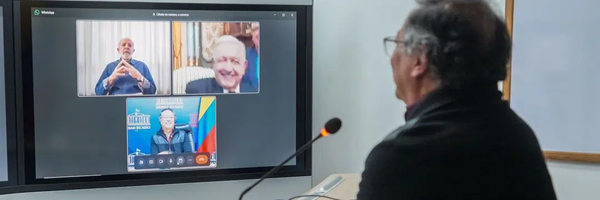What is Petro, Lula, and AMLO’s Diplomatic Strategy for Venezuela?

Ociel Alí López, Orinoco Tribune, August 6, 2024 —
Colombian President Gustavo Petro and his Brazilian counterpart, Luiz Inácio Lula da Silva, have become key players in curbing lawsuits, sanctions and offensives against Venezuela as tensions simmer after the July 28 elections.
“The scrutiny is the conclusion of any electoral process,” said President Petro recently. “It must be transparent and ensure peace and democracy.” Petro’s statement reaffirmed his commitment to preventing further foreign interference in Venezuela’s institutional processes.
Petro is confident that the solution lies in the hands of Venezuela and not in other countries. In response to the appreciation expressed by opposition leader María Corina Machado to the pronouncement of the Colombian Foreign Ministry at the OAS meeting held on July 31, Petro said: “It is not a foreign government that should decide who is the president of Venezuela. It is up to the Venezuelans to reach a political agreement so that the violence in their country ceases and to establish a transparent way to carry out a scrutiny with guarantees for all.”
Any attempt by the US government to name a winner will only lead to a repeat of the failed “Guaidó experiment,” in which more than 50 Western countries recognized, under Washington’s dictates, a parallel government that was as ineffective as it was ridiculous.
The reminder to Machado was timely. The day before, Brian Nichols, US assistant secretary of state for Western Hemisphere affairs, declared the opposition candidate Edmundo González as the winner in the July 28 presidential election, a direct contradiction of the conclusions of Venezuela’s National Electoral Council (CNE) on Sunday [July 28] night.
Therefore, although the Colombian president questioned Machado’s social media post, he was indirectly targeting Washington because of the precedent of Nichols’ statements.
The night of the elections, the CNE announced results after 80% of the votes had been tallied. At that time, President Maduro obtained 51.2% against 44% for Edmundo González. Thus, President Maduro received about 700,000 votes more than González.
However, the government noted that the CNE was subjected to cyberattacks, originating from North Macedonia, which prevented it from finalizing the count and complying with the established electoral protocol. Therefore, President Maduro requested that the Supreme Court of Justice (TSJ) receive and process the voting records from the political parties that participated in the event, which already had them in their hands due to the fact that the CNE prints one for each witness at the polling stations themselves, which makes the system fully auditable.
President Maduro’s allies look to the fairness of the electoral system to demand that the world not make the mistake of proclaiming a president from abroad again. However, they also asked the government for clarity regarding the disclosure of the voting records.
The leaders of Mexico and Brazil have aligned their positions with those of President Petro. The nuance is that López Obrador, for his part, has also lashed out against the attempt by the Organization of American States (OAS) to intervene in the matter.
“Why does the OAS have to get involved?” asked AMLO. “That is interference. That is why the OAS has no credibility. On what grounds does the OAS says that the other candidate won? Where is the evidence? Let all the votes be counted, let the voting records be reviewed.”
Lula, for his part, has become a hinge between this group of presidents and Washington. In fact, he held a conversation with Joe Biden on July 31 afternoon which resulted in a joint communiqué that seemed to slow down the White House’s rampage against Caracas.
On Thursday [August 1], the presidents of the three countries (Colombia, Mexico, and Brazil) spoke on telephone and then issued a joint statement in order to form a shared position to help ease tensions. The statement demanded that the opposition “exercise caution and contain its demonstrations” and that the Venezuelan electoral authorities “move forward expeditiously and make public the data of each polling station.”
The statement makes no reference to the transfer of the counting process to the TSJ, as requested by President Maduro through an electoral contentions appeal.
